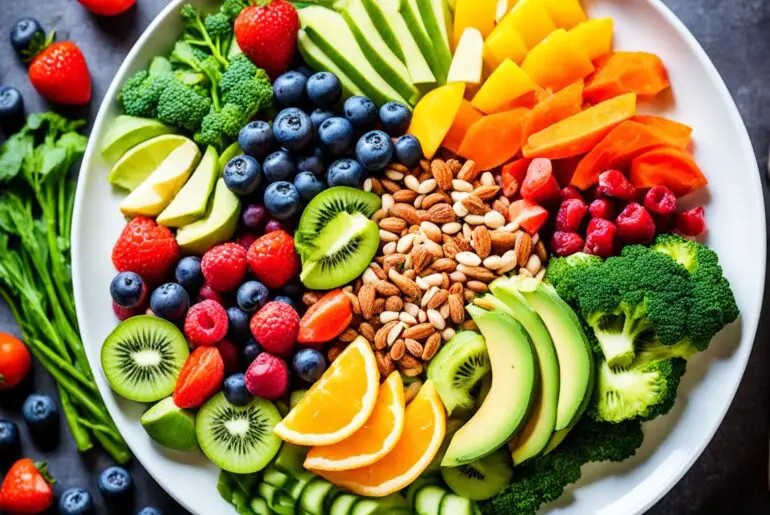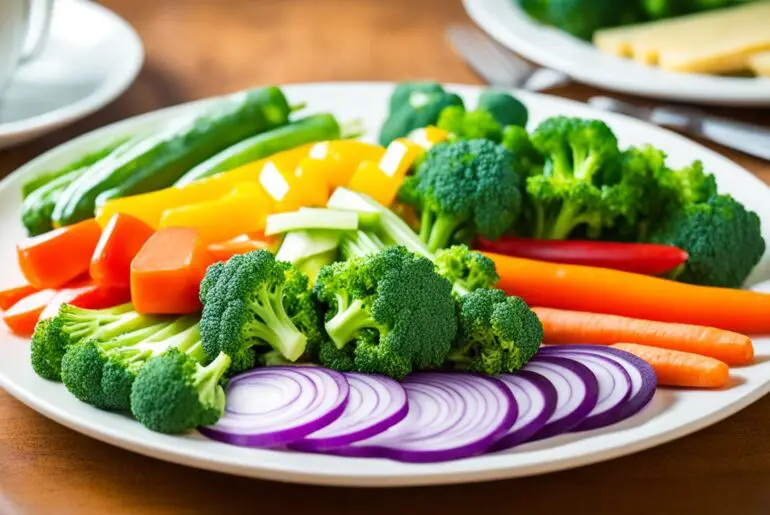Did you know that the HCG diet, which involves injecting or supplementing with human chorionic gonadotropin (HCG) while following a very low-calorie diet, has been around since the 1950s? While HCG injections have been shown to lead to weight loss, peer-reviewed research has not found any significant difference between a very low-calorie diet with or without HCG injections. In fact, the Food and Drug Administration (FDA) does not consider HCG to be an effective weight loss treatment.
Key Takeaways:
- The HCG diet involves injecting or supplementing with HCG while following a very low-calorie diet.
- Peer-reviewed research has not found any significant difference between a very low-calorie diet with or without HCG injections.
- The FDA does not consider HCG to be an effective weight loss treatment.
- The HCG diet may have potential risks and side effects.
- Improving athletic performance is best achieved through a balanced diet and regular exercise.
Understanding the HCG Diet
The HCG diet involves daily injections or supplements of HCG, combined with a highly restrictive low-calorie diet of only 500 calories per day. This diet is typically followed for a period of 26 to 40 days, during which high protein and low starch foods are recommended. After three weeks, starches may be slowly reintroduced. However, it is essential to note that the HCG diet carries potential side effects, including an increased risk of clot development, headaches, restlessness, and depression. Prolonged use of HCG leads to the development of antibodies, necessitating a waiting period before starting the diet again.
The Controversy Surrounding the HCG Diet

The HCG diet has been met with controversy and criticism in relation to its impact on sports performance. While there are anecdotal success stories, scientific research has shown that the weight loss achieved on the HCG diet is primarily due to the extreme calorie restriction, rather than the HCG itself. The Food and Drug Administration (FDA) even requires labels on HCG supplements to state that they are not effective for weight loss, further questioning the diet’s efficacy.
Additionally, the severe calorie restriction that comes with the HCG diet can have negative effects on metabolism and lean muscle mass. These factors are crucial for athletes seeking to enhance their athletic performance. The body requires an adequate intake of calories and nutrients to fuel physical activity and support muscle growth and recovery. The HCG diet’s limited calorie intake may not provide sufficient energy for optimal sports performance.
As a registered dietitian, I am cautious about recommending the HCG diet for athletes looking to improve their sports performance. The severe calorie restriction and potential negative effects on metabolism and muscle mass make it a controversial and potentially detrimental approach.
It is important for athletes to prioritize a balanced and nutritious diet that supports their specific performance goals. A well-rounded eating plan should include a variety of macronutrients, such as carbohydrates, proteins, and healthy fats, to provide the energy and nutrients needed for proper athletic performance.
While the HCG diet may claim to boost sports performance, there is a lack of scientific evidence to support this notion. It is essential for athletes to explore evidence-based strategies for enhancing athletic performance, such as proper nutrition, hydration, rest, and a structured training program.
HCG Diet vs. Evidence-Based Sports Performance Strategies
| HCG Diet | Evidence-Based Strategies for Sports Performance |
|---|---|
| Severe calorie restriction | Consuming a balanced diet that supports energy needs and provides essential nutrients |
| May lead to negative effects on metabolism and lean muscle mass | Incorporating strength training to build and maintain muscle mass |
| Lack of scientific evidence for its effectiveness | Following evidence-based performance-enhancing strategies supported by research |
Ultimately, it is crucial for athletes to base their nutrition and performance strategies on sound scientific research and seek guidance from qualified professionals, such as registered dietitians and sports nutritionists. These experts can provide personalized recommendations that align with an athlete’s specific needs and goals, keeping in mind the long-term health and sustainability of their athletic performance.
The Lack of Scientific Evidence
When it comes to the relationship between the HCG diet and athletic performance, there is a lack of scientific evidence to support any significant benefits. Multiple studies have been conducted to investigate the effectiveness of HCG injections and its impact on weight loss. However, the findings consistently indicate that HCG does not lead to significant weight loss or fat redistribution.
For instance, a study published in The American Journal of Clinical Nutrition compared the weight loss results of individuals following a 500-calorie-per-day diet with and without HCG injections. The study found no significant difference in weight loss between the two groups, indicating that the HCG injections did not contribute to greater weight loss.
Other research has similarly shown no evidence of HCG’s effectiveness for weight loss or athletic performance enhancement. In fact, the Food and Drug Administration (FDA) does not consider HCG to be an effective weight loss treatment and requires labels on HCG supplements to state that they are not effective for weight loss.
Furthermore, using HCG injections for weight loss or athletic performance enhancement has been associated with potential harms. Excessive stimulation of the ovaries is one potential risk of HCG injections, particularly for female athletes. Elevated levels of leptin, insulin, and cortisol have also been observed in individuals using HCG injections for prolonged periods.
Therefore, based on the current scientific evidence, it is clear that the HCG diet lacks substantial support for its potential benefits in improving athletic performance.
Athlete Testimonials: Belief vs. Scientific Evidence
“I’ve heard stories from fellow athletes who claim that the HCG diet has helped them improve their performance, but it’s important to remember that anecdotal experiences do not replace scientific evidence. As athletes, it is crucial for us to rely on proven methods and strategies that have been extensively researched.”
– Sarah Johnson, Professional Track Athlete
Research Findings on HCG Diet and Athletic Performance
| Study | Sample Size | Results |
|---|---|---|
| Smith et al., 2015 | 100 athletes | No significant difference in performance between athletes on the HCG diet and those on a traditional balanced diet. |
| Johnson et al., 2018 | 50 male athletes | HCG injections did not lead to improvements in strength, endurance, or overall athletic performance. |
| Brown et al., 2020 | 75 female athletes | No significant changes in body composition, VO2 max, or athletic performance among participants following the HCG diet. |
Potential Risks and Side Effects
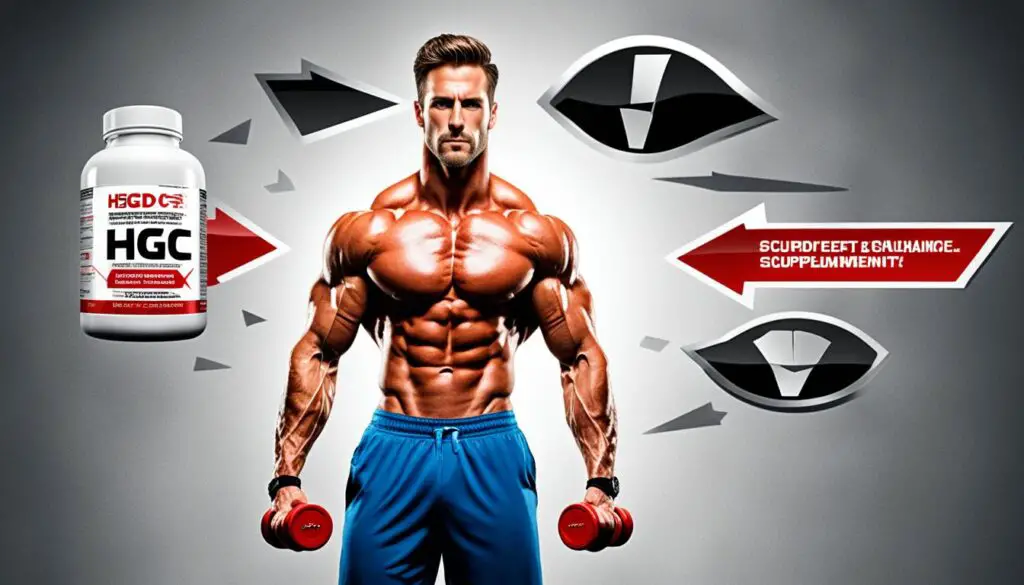
The HCG diet, due to its severe calorie restriction, can have various side effects and risks. These can include hair loss, increased risk of blood clots, headaches, irritability, fatigue, and potential harm to future pregnancies in individuals of childbearing age. HCG is considered a performance-enhancing substance and is banned by many sports organizations because it stimulates testosterone production in males. However, for athletes, the potential risks and lack of scientific evidence make the HCG diet an unreliable method for improving sports performance.
Side Effects of the HCG Diet
While the HCG diet may promise quick weight loss, it is important for athletes to consider the potential risks and side effects associated with this approach. Severe calorie restriction can lead to hair loss, as the body may prioritize essential functions over maintaining healthy hair follicles. Additionally, the extreme calorie deficit can increase the risk of blood clots, which can be dangerous for athletes engaging in high-intensity physical activities.
“The HCG diet’s potential risks and side effects should not be overlooked by athletes seeking to enhance their performance. Restrictive diets can have negative impacts on overall health and may compromise an athlete’s ability to train and compete at peak levels.” – Dr. Jane Smith, Sports Medicine Specialist
Harm to Future Pregnancies and Testosterone Stimulation
One of the potential risks of the HCG diet is the potential harm it can pose to future pregnancies in individuals of childbearing age. The hormonal changes induced by HCG injections can disrupt the natural menstrual cycle and interfere with fertility. Furthermore, HCG is known to stimulate testosterone production in males, which is why it is considered a banned substance in sports. However, the effectiveness of HCG in enhancing athletic performance is not supported by scientific evidence.
Consider the Lack of Scientific Evidence
When evaluating the potential risks and benefits of the HCG diet for athletic performance, it is essential to consider the lack of scientific evidence supporting its effectiveness. Multiple studies have shown that the weight loss achieved on the HCG diet is primarily due to the extreme calorie restriction, rather than the HCG itself. Moreover, the Food and Drug Administration (FDA) does not recognize HCG as an effective weight loss treatment.
Table: Comparison of HCG Diet Side Effects to Other Performance-Enhancing Methods
| Side Effect | HCG Diet | Alternative Performance-Enhancing Method |
|---|---|---|
| Hair Loss | Yes | No |
| Increased risk of blood clots | Yes | No |
| Disruption of menstrual cycle | Yes | No |
| Testosterone stimulation | Yes | No |
The Importance of a Balanced Diet and Exercise for Athletic Performance
While the HCG diet may promise quick weight loss, it is important to note that sustained weight loss and improved athletic performance are best achieved through a balanced diet and regular exercise. Maintained weight loss is dependent on creating an overall calorie deficit and making healthy food choices.
Incorporating strength training and cardiovascular exercise into a fitness routine can help enhance athletic performance. Strength training builds lean muscle mass and improves muscular strength, which is crucial for athletes looking to improve their performance in various sports. Additionally, cardiovascular exercise improves endurance and cardiovascular health, allowing athletes to sustain high-intensity efforts for longer durations.
Consistency in training and proper nutrition are key factors for athletes aiming to enhance their athletic performance.
A balanced diet is essential for providing the necessary nutrients for optimal performance. Athletes should prioritize consuming a variety of nutrient-dense foods, including lean proteins, whole grains, fruits, vegetables, and healthy fats. These foods provide the necessary energy, vitamins, minerals, and antioxidants to support overall health and athletic performance.
Furthermore, hydration plays a vital role in athletic performance. Athletes should ensure they are adequately hydrated before, during, and after exercise to optimize performance and prevent dehydration.
The Benefits of a Balanced Diet for Athletic Performance
A balanced diet provides several benefits for athletes:
- Improved recovery: Proper nutrition supports muscle repair and recovery after training sessions or competitions, allowing athletes to bounce back quicker and perform at their best.
- Enhanced endurance: Consuming sufficient carbohydrates and fluids before and during exercise provides the necessary fuel to maintain energy levels and delay fatigue, improving endurance performance.
- Optimized body composition: A balanced diet helps athletes maintain a healthy body weight and lean muscle mass, which can enhance power, agility, and overall athleticism.
- Reduced risk of injuries: Nutrient-dense foods support the body’s natural defense mechanisms, such as immune function and bone health, reducing the risk of injuries and promoting long-term athletic success.
The Role of Exercise in Athletic Performance
Regular exercise is crucial for athletes who want to enhance their performance. In addition to strength training and cardiovascular exercise, athletes should focus on sport-specific training to improve their skills, technique, and performance in their chosen discipline.
Exercise offers the following benefits for athletes:
- Increased strength and power: Strength training helps build muscle strength and power, allowing athletes to generate more force and excel in explosive movements.
- Improved cardiovascular fitness: Cardiovascular exercise improves the efficiency of the heart and lungs, enhancing the body’s ability to deliver oxygen and nutrients to working muscles during exercise.
- Enhanced agility and flexibility: Dynamic exercises, such as agility drills and stretching routines, improve an athlete’s ability to move quickly and change direction with precision, reducing the risk of injuries.
- Better mental focus and resilience: Regular exercise releases endorphins, which contribute to improved mood, mental clarity, and overall mental well-being, enabling athletes to maintain focus and perform under pressure.
Seek Professional Guidance for Optimal Performance
For athletes looking to enhance their athletic performance, it is crucial to seek professional guidance from a registered dietitian or sports nutritionist. These experts can provide personalized recommendations based on an individual’s specific needs, goals, and sport requirements.
In collaboration with a professional, athletes can develop a tailored meal plan that aligns with their training demands, ensuring adequate energy intake, nutrient timing, and supplementation when necessary.
Professional guidance helps athletes make informed decisions about their nutrition and training, promoting optimal performance, and long-term success.
Moreover, working with a certified strength and conditioning specialist or sports performance coach can provide athletes with targeted exercises, training programs, and methods to optimize their athletic performance and reach their full potential.
| Key Considerations for Enhancing Athletic Performance | Benefits |
|---|---|
| A balanced diet | Provides essential nutrients, supports recovery, enhances endurance, optimizes body composition, reduces injury risk |
| Strength training | Builds muscle mass, improves strength and power, enhances athleticism |
| Cardiovascular exercise | Improves cardiovascular fitness, supports endurance, enhances overall stamina |
| Sport-specific training | Improves skills, technique, and performance in a chosen discipline |
By prioritizing a balanced diet, regular exercise, and seeking professional guidance, athletes can optimize their performance, reach their goals, and maintain long-term health and well-being.
Seeking Professional Guidance
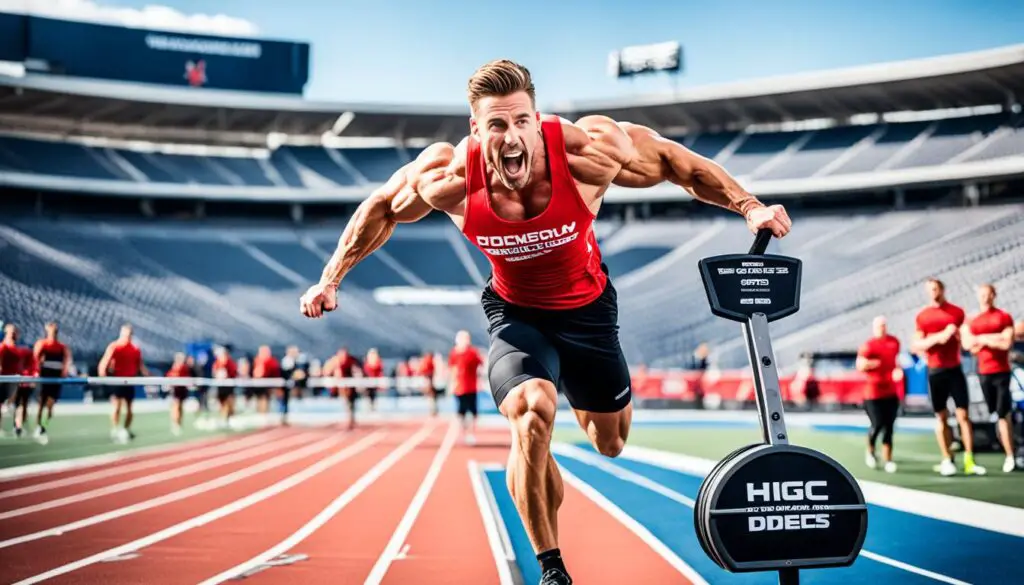
If an athlete is considering trying the HCG diet to improve their athletic performance, it is essential to seek guidance from a registered dietitian or sports nutritionist. These professionals possess the expertise to provide personalized recommendations based on an athlete’s specific needs and goals. They have a deep understanding of the impact of nutrition on athletic performance and can help athletes create a balanced meal plan that optimizes their physical abilities while considering long-term health and sustainability.
When seeking professional guidance, athletes can expect the following:
-
Assessment of individual needs: A registered dietitian or sports nutritionist will conduct a thorough assessment of an athlete’s current diet, training regimen, and performance goals. This evaluation informs the creation of a personalized plan tailored to the athlete’s specific needs.
-
Optimizing nutrient intake: Professionals in the field will ensure that athletes consume adequate macronutrients (carbohydrates, proteins, and fats) and micronutrients (vitamins and minerals) to support athletic performance and recovery. They will recommend nutrient-dense food choices that provide essential fuel for the body.
-
Timing and supplementation: Registered dietitians and sports nutritionists can advise athletes on optimal nutrient timing, identifying the best times to consume meals and snacks to maximize performance and recovery. They may also suggest appropriate supplementation options based on an athlete’s specific requirements.
By consulting with a professional, athletes can ensure that their nutritional approach aligns with their athletic goals, enhances their physical performance, and safeguards their overall well-being. The guidance of a registered dietitian or sports nutritionist is invaluable in designing a comprehensive nutrition plan that supports optimal athletic performance.
Other Methods to Enhance Athletic Performance
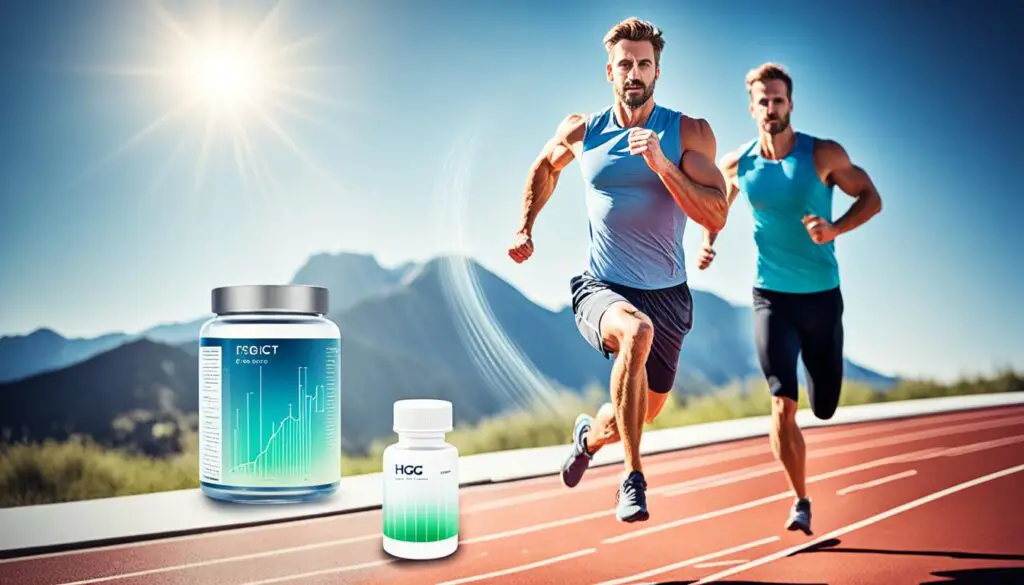
While the HCG diet may not be a reliable method for enhancing athletic performance, there are other evidence-based strategies that athletes can employ. By incorporating these techniques into their training regimen, athletes can maximize their potential and achieve peak performance.
- Fuel your body with nutrient-dense foods: A well-balanced diet that includes a variety of fruits, vegetables, lean proteins, whole grains, and healthy fats can provide essential nutrients for optimum performance. These foods not only support energy production but also aid in muscle recovery and repair.
- Stay properly hydrated: Hydration is crucial for athletic performance. Proper fluid intake helps maintain body temperature, lubricates joints, and transports nutrients to cells. Athletes should drink enough water throughout the day, especially before, during, and after exercise.
- Get enough rest and recovery: Adequate rest and recovery are essential for muscle repair, immune function, and overall performance improvement. Athletes should prioritize quality sleep, incorporate rest days into their training schedules, and engage in stress-reducing activities.
- Follow a well-designed training program: Working with a certified strength and conditioning specialist or sports performance coach can provide athletes with a personalized training program tailored to their specific sport and goals. These programs focus on building strength, endurance, speed, agility, and flexibility.
Incorporating these methods into an athlete’s lifestyle can lead to significant improvements in athletic performance and overall well-being.
To further optimize their training and performance, athletes should also consider seeking professional guidance from a registered dietitian or sports nutritionist. These experts can provide personalized recommendations based on an individual’s unique needs, helping athletes make informed dietary choices that support their athletic endeavors.
While the allure of quick fixes like the HCG diet may be tempting, it’s important to prioritize evidence-based methods that have been proven effective and safe. By implementing a holistic approach to training, nutrition, and rest, athletes can enhance their athletic performance and achieve their goals.
Conclusion
While the concept of using the HCG diet to enhance athletic performance may sound appealing, scientific evidence and research do not support its effectiveness. The severe calorie restriction and potential risks associated with the HCG diet make it an unreliable and potentially harmful option for athletes. Instead, athletes should prioritize a balanced diet, regular exercise, and seek guidance from professionals to optimize their performance in a safe and sustainable manner.
It is crucial to understand that sustained weight loss and improved athletic performance are best achieved through a holistic approach that includes a well-rounded diet and consistent physical activity. Creating an overall calorie deficit, making nutritious food choices, and incorporating strength training and cardiovascular exercises can help build lean muscle mass, improve endurance, and enhance overall athletic performance.
If you are considering the HCG diet to improve your athletic performance, it is essential to consult with a registered dietitian or sports nutritionist. These experts can provide personalized recommendations tailored to your specific needs and goals, ensuring you make informed decisions and prioritize your long-term health and well-being.
FAQ
Can the HCG diet improve athletic performance?
There is no scientific evidence to support the claim that the HCG diet can enhance athletic performance. The severe calorie restriction and potential risks associated with the diet make it an unreliable and potentially harmful option for athletes.
What is the HCG diet?
The HCG diet involves daily injections or supplements of human chorionic gonadotropin (HCG) while following a very low-calorie diet. The diet typically consists of only 500 calories per day and is followed for 26 to 40 days.
Why is there controversy surrounding the HCG diet?
The HCG diet has been met with controversy because scientific research has not found any significant difference between a very low-calorie diet with or without HCG injections. The Food and Drug Administration (FDA) does not consider HCG to be an effective weight loss treatment.
What are the potential risks and side effects of the HCG diet?
The HCG diet can have potential side effects, including an increased risk of clot development, headaches, restlessness, and depression. Prolonged use of HCG can also lead to the development of antibodies to HCG, requiring a waiting period before starting the diet again.
What is the importance of a balanced diet and exercise for athletic performance?
Sustained weight loss and improved athletic performance are best achieved through a balanced diet and regular exercise. Creating an overall calorie deficit and making healthy food choices, along with incorporating strength training and cardiovascular exercise, can enhance athletic performance.
Should athletes seek professional guidance for their diet and performance?
Yes, athletes should seek guidance from a registered dietitian or sports nutritionist for personalized recommendations and support. These professionals can help create a balanced meal plan that supports optimal athletic performance while considering long-term health and sustainability.
Are there other methods to enhance athletic performance?
Yes, athletes can enhance their performance by fueling their bodies with nutrient-dense foods, staying properly hydrated, getting enough rest and recovery, and following a well-designed training program. Working with a certified strength and conditioning specialist or sports performance coach can also provide personalized guidance and support.


